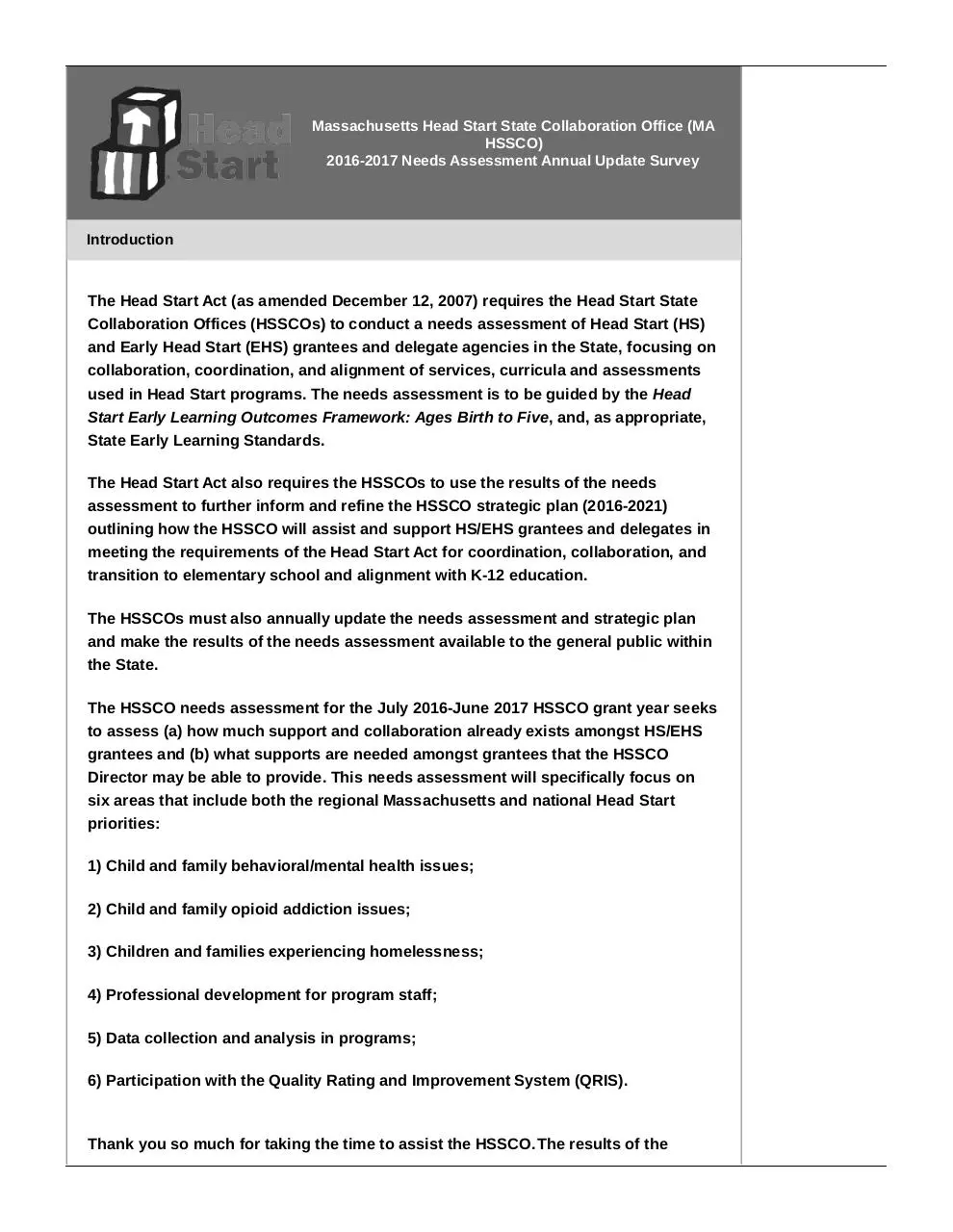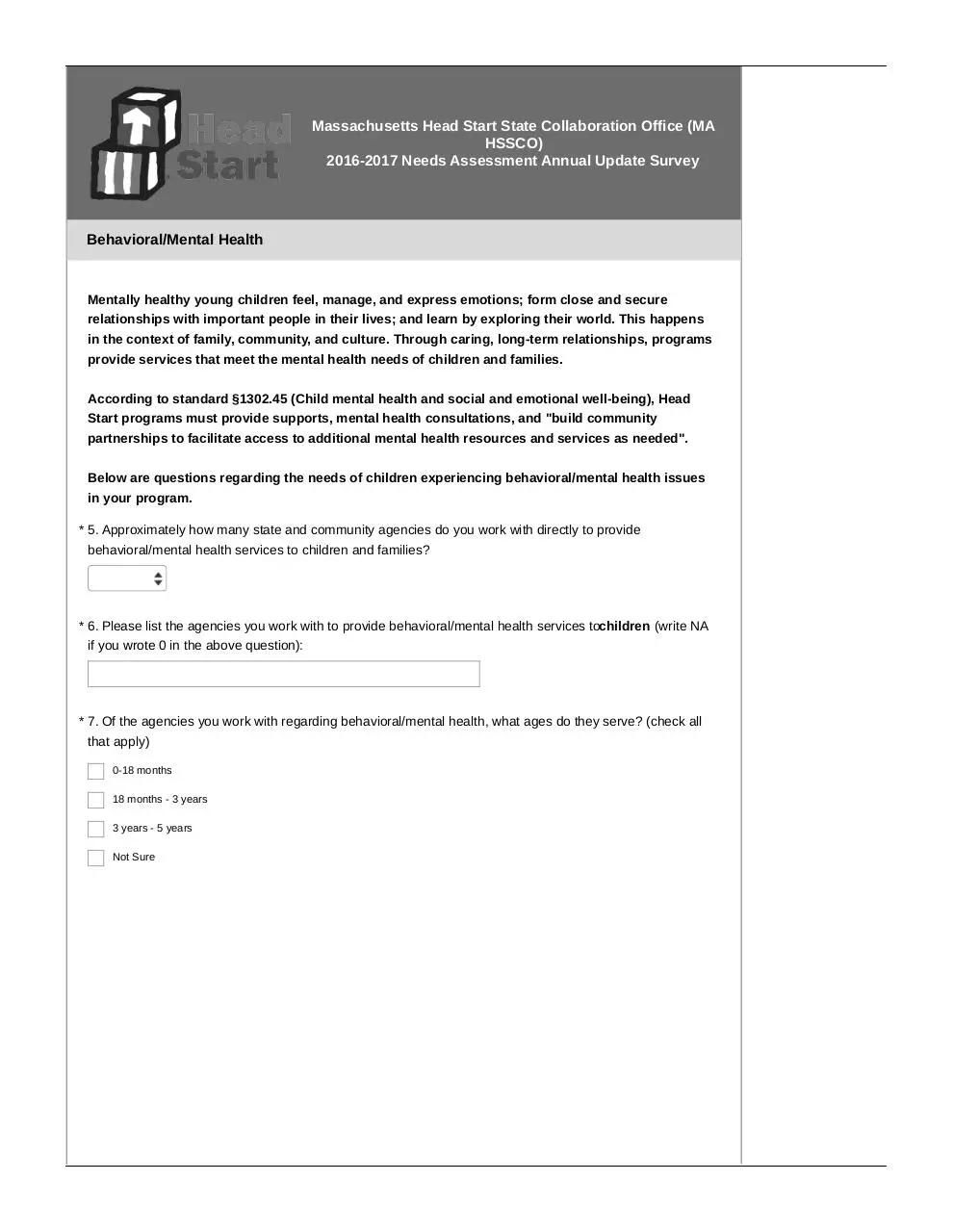HSSCO Needs Assessment 2016 2017 (PDF)
File information
Title: View Survey
This PDF 1.4 document has been generated by wkhtmltopdf 0.12.1 / Qt 4.8.6, and has been sent on pdf-archive.com on 26/07/2017 at 20:54, from IP address 146.243.x.x.
The current document download page has been viewed 619 times.
File size: 496.07 KB (20 pages).
Privacy: public file





File preview
Massachusetts Head Start State Collaboration Office (MA
HSSCO)
2016-2017 Needs Assessment Annual Update Survey
Introduction
The Head Start Act (as amended December 12, 2007) requires the Head Start State
Collaboration Offices (HSSCOs) to conduct a needs assessment of Head Start (HS)
and Early Head Start (EHS) grantees and delegate agencies in the State, focusing on
collaboration, coordination, and alignment of services, curricula and assessments
used in Head Start programs. The needs assessment is to be guided by the Head
Start Early Learning Outcomes Framework: Ages Birth to Five, and, as appropriate,
State Early Learning Standards.
The Head Start Act also requires the HSSCOs to use the results of the needs
assessment to further inform and refine the HSSCO strategic plan (2016-2021)
outlining how the HSSCO will assist and support HS/EHS grantees and delegates in
meeting the requirements of the Head Start Act for coordination, collaboration, and
transition to elementary school and alignment with K-12 education.
The HSSCOs must also annually update the needs assessment and strategic plan
and make the results of the needs assessment available to the general public within
the State.
The HSSCO needs assessment for the July 2016-June 2017 HSSCO grant year seeks
to assess (a) how much support and collaboration already exists amongst HS/EHS
grantees and (b) what supports are needed amongst grantees that the HSSCO
Director may be able to provide. This needs assessment will specifically focus on
six areas that include both the regional Massachusetts and national Head Start
priorities:
1) Child and family behavioral/mental health issues;
2) Child and family opioid addiction issues;
3) Children and families experiencing homelessness;
4) Professional development for program staff;
5) Data collection and analysis in programs;
6) Participation with the Quality Rating and Improvement System (QRIS).
Thank you so much for taking the time to assist the HSSCO. The results of the
HSSCO needs assessment will directly inform the HSSCO Director on how to better
support your programs' needs for systems development in Massachusetts. Our
shared goal is to support and promote your success in serving our Head Start and
Early Head Start children and families.
Massachusetts Head Start State Collaboration Office (MA
HSSCO)
2016-2017 Needs Assessment Annual Update Survey
General Information
Please complete this survey by 5pm on 6/19/17. Please answer the questions to the
best of your knowledge. If you have any questions about this survey please contact:
Carol Nolan, Head Start State Collaboration Office Director
617-988-7816
Carol.Nolan@massmail.state.ma.us
* 1. Program Name:
* 2. Your program provides services through the following grants/programs: (Check all that apply)
Head Start
Early Head Start
Migrant - Seasonal
EEC Child Care Contract Slot
EEC Child Care Voucher
Early Head Start - Child Care Partnership
Preschool Expansion Grant
Family Child Care
Home Visiting
Other (please specify)
3. What do you believe is the most important priority area for the HSSCO Director to focus on in the
coming year? (1=Most Important, 6=Least Important)
Mental Health
Opioid Crisis
Homelessness
Professional Development
Data
Quality Rating and Improvement System (QRIS)
Other:
4. If Other, please describe, otherwise leave blank.
Massachusetts Head Start State Collaboration Office (MA
HSSCO)
2016-2017 Needs Assessment Annual Update Survey
Behavioral/Mental Health
Mentally healthy young children feel, manage, and express emotions; form close and secure
relationships with important people in their lives; and learn by exploring their world. This happens
in the context of family, community, and culture. Through caring, long-term relationships, programs
provide services that meet the mental health needs of children and families.
According to standard §1302.45 (Child mental health and social and emotional well-being), Head
Start programs must provide supports, mental health consultations, and "build community
partnerships to facilitate access to additional mental health resources and services as needed".
Below are questions regarding the needs of children experiencing behavioral/mental health issues
in your program.
* 5. Approximately how many state and community agencies do you work with directly to provide
behavioral/mental health services to children and families?
* 6. Please list the agencies you work with to provide behavioral/mental health services tochildren (write NA
if you wrote 0 in the above question):
* 7. Of the agencies you work with regarding behavioral/mental health, what ages do they serve? (check all
that apply)
0-18 months
18 months - 3 years
3 years - 5 years
Not Sure
* 8. How confident are your program staff in the following?
Not Confident
A Little Confident
Somewhat Confident
Very Confident
Screening and
identifying children with
behavioral/mental health
issues
Making referrals to link
children to
behavioral/mental health
services.
Communicating to
parents/caregivers
about behavioral/mental
health services for their
children.
Partnering with
behavioral/mental
health agencies to
deliver services.
* 9. Please list the most useful trainings/professional development opportunities that educators at your
program received in behavioral/mental health:
* 10. Please check all the following tools your program staff use to support children's social and emotional development in the learning
environment:
ASQ-3
ASQ:SE
Pyramid Model
TPOT
Second Step
TPITOS
Other (please specify all other tools)
* 11. Who provides on-site mental health consultations at your program?
Staff
Contractor
Both
N/A
* 12. In the past year has your program received additional assistance from the EEC Early Childhood Mental
Health Consultation grant?
Yes
No
13. If yes, please check the Early Childhood Mental Health Consultation grantees: (leave blank if not
applicable)
Behavioral Health Network
Community Healthlink
Enable, Inc.
Justice Resource Institute, Inc.
Massachusetts Society for the Prevention of Cruelty to Children
The Home for Little Wanderers
* 14. In the last year, how has access to behavioral/mental health services changed for children aged 0-3 in
your program?
Decreased
Substantially
Decreased
Stayed the Same
Increased
Increased
Substantially
ý
S
ý
S
ý
S
ý
S
ý
S
N/A
* 15. In the last year, how has access to behavioral/mental health services changed for children aged 3-5 in
your program?
Decreased
Substantially
Decreased
Stayed the Same
Increased
Increased
Substantially
ý
S
ý
S
ý
S
ý
S
ý
S
N/A
* 16. Please prioritize the following areas for your program regarding behavioral/mental health services for
children and families that the HSSCO Director may be able to assist you with: (1= Most Important, 3=Least
Important)
Provide supports for for effective classroom management and positive learning environments.
Secure consistent mental health consultation services.
Build community partnerships to facilitate access to additional behavioral/mental health resources and services.
* 17. What successful strategies have you implemented to address the behavioral/mental health needs of the
children and families in your program?
Massachusetts Head Start State Collaboration Office (MA
HSSCO)
2016-2017 Needs Assessment Annual Update Survey
Opioid Addiction
The heroin and opioid epidemic has touched every community in the Commonwealth and
transcended boundaries of income, education, age, and racial/ethnic identities. While once labeled
with the stigma of a crime, the medical community—and now the Commonwealth of Massachusetts
– has come to understand that opioid addiction is more properly labeled a chronic disease.
Understanding its origins and treating it like a chronic disease (similar to asthma or diabetes) is
critical to better outcomes for individuals, families, and communities.
According to standard §1302.53 (Community partnerships and coordination with other early
childhood and education programs), Head Start programs "must establish necessary collaborative
relationships and partnerships with community organizations that may include Health care
providers...and substance abuse treatment providers".
Below are questions regarding the needs of children and families impacted by opioid addiction in
your program.
* 18. Approximately how many state and community agencies do you work with directly regarding opioid
addiction?
* 19. Please list the state and community agencies you work with that deal specifically with supporting
families impacted by opioid addiction (write NA if you wrote 0 in the above question):
* 20. How confident are your program staff in the following?
Not Confident
Identifying children and
families impacted by
opioid addiction.
Making referrals
to services that support
children and families
impacted by opioid
addiction.
Helping families
navigate services for
children and families
impacted by opioid
addiction.
Partnering
with community health
agencies on addressing
issues of opioid
addiction.
A Little Confident
Somewhat Confident
Very Confident
* 21. Please list the most useful trainings/professional development opportunities that educators received at
your program regarding opioid addiction/substance abuse (write NA if not applicable):
* 22. In the last year, how has access to opioid support/treatment services changed for families in your
program?
Decreased Substantially
Decreased
Stayed the Same
Increased
Increased Substantially
ý
S
ý
S
ý
S
ý
S
ý
S
* 23. Please prioritize the following areas regarding opioid addiction for children and families in your program
that the HSSCO Director may be able to assist you with: (1=Most Important, 4=Least Important)
Connecting programs to community resources that address the opioid crisis.
Developing resources/toolkits to support program staff in dealing with the opioid crisis.
Learning about other initiatives in Head Start Programs that address the opioid crisis.
Learning about other initiatives in statewide or national programs that address the opioid crisis (not Head Start).
* 24. What successful strategies has your program implemented to address opioid addiction for children and
families in your program?
Download HSSCO Needs Assessment 2016-2017
HSSCO Needs Assessment 2016-2017.pdf (PDF, 496.07 KB)
Download PDF
Share this file on social networks
Link to this page
Permanent link
Use the permanent link to the download page to share your document on Facebook, Twitter, LinkedIn, or directly with a contact by e-Mail, Messenger, Whatsapp, Line..
Short link
Use the short link to share your document on Twitter or by text message (SMS)
HTML Code
Copy the following HTML code to share your document on a Website or Blog
QR Code to this page

This file has been shared publicly by a user of PDF Archive.
Document ID: 0000629179.